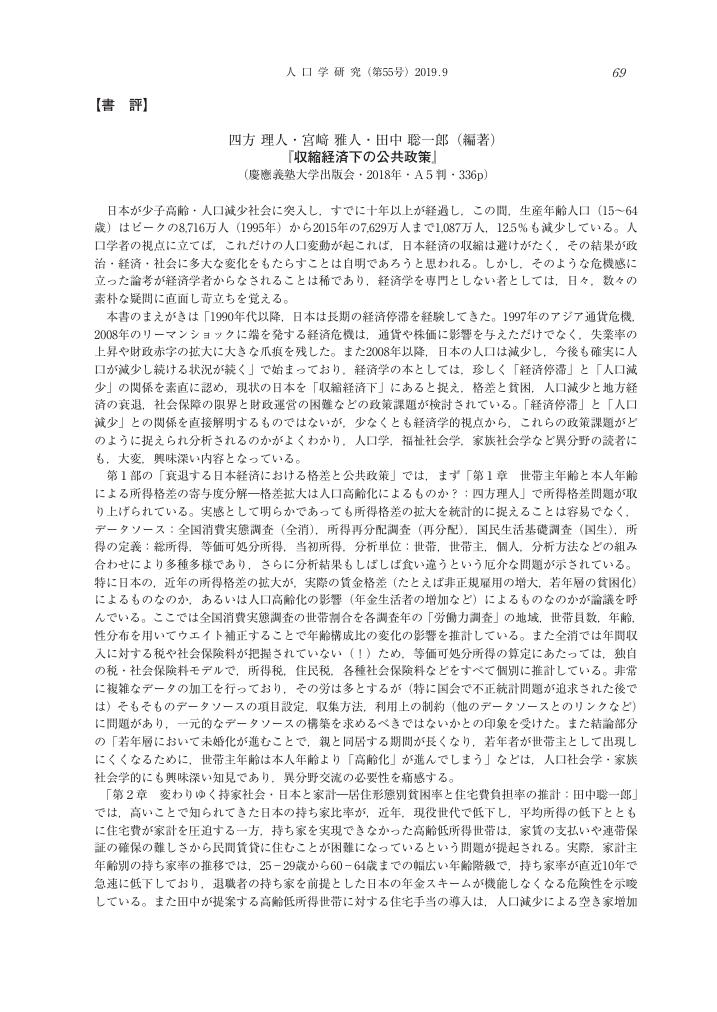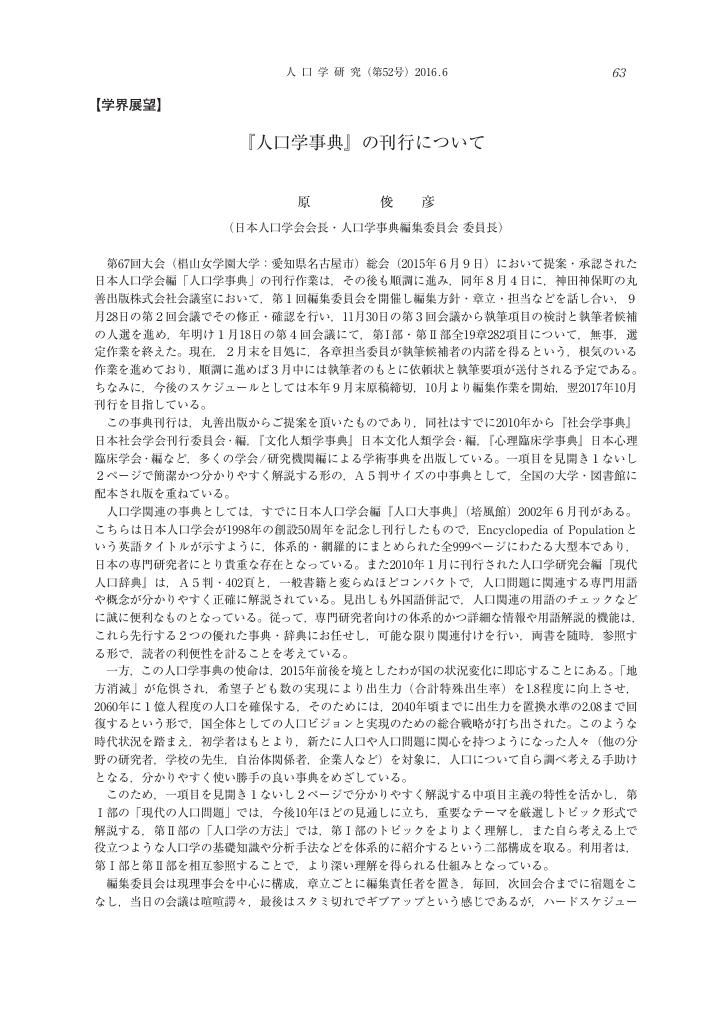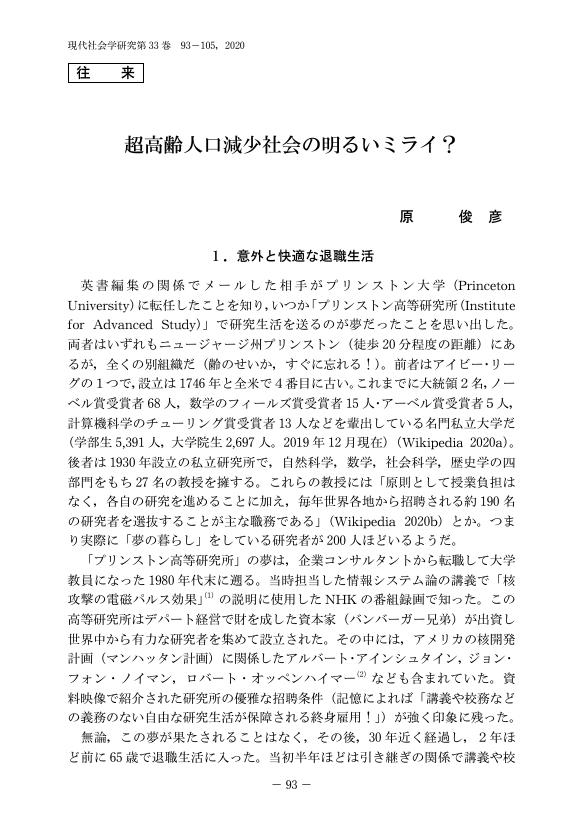7 0 0 0 日本語プログラム言語"ひまわり"を用いた学習支援手法の一検討
- 著者
- 坂崎 俊介 若原 俊彦
- 出版者
- 一般社団法人電子情報通信学会
- 雑誌
- 電子情報通信学会技術研究報告. IN, 情報ネットワーク (ISSN:09135685)
- 巻号頁・発行日
- vol.104, no.564, pp.85-90, 2005-01-13
近年, インターネットの普及により教育分野にもネットワークに接続されたコンピュータが大量に導入され, ネットワークを利用した教育の普及が進んでいる. 米国のADL(Advanced Distributed learning Initiative)が中心となって進められてきた国際標準化によって, SCORM(Sharable Content Object Reference Model)対応のシステム・コンテンツ市場が拡大している. また教材や素材のための学習オブジェクトメタデータ(LOM : Learning Object Metadata)も大きく進展してきており, 今後教育現場においてeラーニングの需要はますます高まると思われる. 本報告では, 学習教材を受講者の理解度や学習パターンに合わせた内容にカスタマイズさせることで, 学習効果を改善させることを狙いとした学習支援システムを提案し, 学習教材の作成手法および支援方法について具体的に述べる.
- 著者
- 原 俊彦
- 出版者
- 日本人口学会
- 雑誌
- 人口学研究 (ISSN:03868311)
- 巻号頁・発行日
- vol.55, pp.69-72, 2019 (Released:2019-10-25)
3 0 0 0 OA アセロラ果汁飲料摂取による肌状態の改善効果
- 著者
- 花村 高行 青木 仁史 内田 絵理子 萩原 俊彦
- 出版者
- 公益社団法人 日本食品科学工学会
- 雑誌
- 日本食品科学工学会誌 (ISSN:1341027X)
- 巻号頁・発行日
- vol.55, no.1, pp.6-12, 2008-01-15 (Released:2008-02-29)
- 参考文献数
- 21
- 被引用文献数
- 1
アセロラはアスコルビン酸含量の高い果実として知られている.アスコルビン酸は必須栄養素としてだけでなく,美白効果をもつ美容素材として化粧品や健康食品に広く使用されている.アセロラの美容効果についてはin vitro試験での有効性は報告されているが,ヒトを対象とした試験の報告は見当たらない.我々は40代の閉経前の健康な女性について,アセロラ果汁飲料の12週間摂取による美容効果をアスコルビン酸含有飲料およびアスコルビン酸を含有しない飲料を対照として二重盲検並行群間比較法により検討した.美容効果の評価は機器による評価,被験者による肌状態のVAS法を用いた自己評価および皮膚科専門医による肌状態の評価により行った.その結果,被験者の自己評価および医師の評価ではアセロラ果汁飲料は2種類の対照飲料より,肌状態に対して高い効果を示した.従って,これらのアセロラ果汁飲料の美容作用には,アスコルビン酸だけでなく他の成分の関与が示唆された.しかしながら,機器による評価では対照とアセロラ果汁摂取で明確な違いは認められなかった.
- 著者
- 原 俊彦
- 出版者
- 日本人口学会
- 雑誌
- 人口学研究 (ISSN:03868311)
- 巻号頁・発行日
- vol.54, pp.69-72, 2018 (Released:2018-10-15)
- 著者
- 原 俊彦
- 出版者
- 日本人口学会
- 雑誌
- 人口学研究 (ISSN:03868311)
- 巻号頁・発行日
- pp.1904003, (Released:2019-08-01)
3 0 0 0 OA 『人口学事典』の刊行について
- 著者
- 原 俊彦
- 出版者
- 日本人口学会
- 雑誌
- 人口学研究 (ISSN:03868311)
- 巻号頁・発行日
- vol.52, pp.63-64, 2016 (Released:2017-11-16)
- 著者
- 槇 俊孝 若原 俊彦
- 出版者
- 一般社団法人電子情報通信学会
- 雑誌
- 電子情報通信学会技術研究報告 = IEICE technical report : 信学技報 (ISSN:09135685)
- 巻号頁・発行日
- vol.113, no.479, pp.5-10, 2014-03-07
近年,グローバル競争が激化したことによりサービスや製品の低価格化が進み,企画・開発研究・試作・評価といった先端研究の効率化が求められ,タイムリーにグローバルな情報の収集・分析により研究方針を示す必要性が高まっている.そこで本研究では,電子情報通信学会の横断分検索システムであるI-Scoverを用いて日本語論文と英語論文のメタデータを分析しキーワードを抽出してWikipediaによる補正を加えて日本語辞書を構築し,先端の技術動向やその要因を可視化する支援システムを提案する.
3 0 0 0 森林開発と人口増加・移動がもたらす感染症リスクの質的・量的評価
バングラデシュの首都ダッカにおける過去20年間の気象データとコレラやその他の下痢症患者数のデータベースを構築した。このデータを用い、降雨量および気温と患者数の関連を時系列統計解析を行なって調べた。その結果、週平均降雨量の増加によりコレラ患者数は14%増加し、コレラ以外の下痢症は5%増加することが明らかとなった。逆に、平均降雨量が減少してもコレラ患者数が増加することも明らかとなった。森林環境を好むマラリア媒介蚊Anopheles dirusのベトナムの森林伐採地における分布を、高解像度の衛星画像と標高データから得られる地被覆および地形の情報を利用して解析した。一般化線形モデルにより、この蚊が森林から20km程度の範囲では自然林に依存していないこと、深い谷があるような地形に多いこと、ゴムの植林地は生息に不適だがカシューナッツの植林地は好適であるらしいことが明らかになった。この地域のAn. dirusは森林から農地へと生息環境を移行させており農薬に用いられるピレスロイド系殺虫剤への抵抗性の獲得が懸念される。都市環境で人工容器を主な発生源とするネッタイシマカに媒介されるデング熱動態の数理モデルを、マイクロソフトエクセルをベースにして開発した。気温、湿度、降雨量が蚊の発生源の数や蚊の生存率、蚊の体内でのウィルスの潜伏期間に影響するというメカニズムを微分方程式で表した。容器の数などを未知のパラメータとし、適当な初期値を代入したモデルに現実の気象データを入力し、計算されたデング患者と現実のデング患者との差が最小になるように未知のパラメータを決定するSimplex法をプログラムに組み込んだ。このモデルを用いてデング熱患者を最小にする殺虫剤噴霧のタイミングを計算したところ、先行研究で示されたものとは異なり患者数のピークよりも前が最適であると結論された。
2 0 0 0 OA 超高齢人口減少社会の明るいミライ?
- 著者
- 原 俊彦
- 出版者
- 北海道社会学会
- 雑誌
- 現代社会学研究 (ISSN:09151214)
- 巻号頁・発行日
- vol.33, pp.93-105, 2020 (Released:2021-08-01)
- 参考文献数
- 10
2 0 0 0 OA ドイツの少子化と家族政策の転換
- 著者
- 原 俊彦
- 出版者
- 日本人口学会
- 雑誌
- 人口学研究 (ISSN:03868311)
- 巻号頁・発行日
- vol.42, pp.41-55, 2008-05-31 (Released:2017-09-12)
In Germany,TFR stagnate at below replacement level ranging from 1.3 to 1.6 with some fluctuation for over 30 years.Any arguments and policies to promote births ware tabooed due to nightmare memories about pronatalistic policies,which accompanied racial discrimination under the Nazi regime.For this reason,the basic standpoint for family policy is that the government should be responsible for family according to constitutional prescription but act only in a subsidiary function to marriage and family and avoid any intervention in individual affairs. However, this political attitude began to be revised under the first Schroder SPD government and Renate Schmidt was inaugurated as the federal minister of Families, Seniors,Women and Youth,and it came to emphasize the importance of the family policy which focused on the population problem. This new wave of family policy change was taken over also to a large coalition government with the Christian Democratic Union (CDU) born by the federal elections in 2005, and becomes fruitful as the 7th family report (the rough mapping 2005, definite version 2006)and the new policy measures are beginning to be implemented one after another,such as the revision of the promotion law for construction of childcare centers,the introduction of a parents allowance (Elterngeld), "house of many generations" project, etc.. This paper focuses on this recent drastic change of family policy in Germany.We analyze its demographic backgrounds and show the new policy measures and their expected effects. The important topics of this paper are: 1. As for fertility, in 30 years long stagnation of TFR, Germany became far behind Scandinavian, Anglo-Saxon countries and other EU members. Remarkable recovery of TFR in neighboring-country France is seemed to be especially a big shock for Germany. 2.The childlessness of Germany is increasing and according to the recent research,one per three German women could be childless at a whole life.In addition,the average number of desired children is decreasing to 1.75 in women and 1.59 in men at age 20-49, clearly lower than reproduction level. 3. The 10th population projection of the Federal Statistics Bureau (medium variant) has presupposed that the decrease in total population would be started in 2012 but has been realized since 2003. In Germany,while the number of birth decreases further because of the post baby boomer parents,the increase in the number of death is also expected by the aging society, a long-term population reduction is not avoidable, like Japan. 4. According to the time scenario for TFR in future by Hans Bertram, the leader of the experts team compiled the 7th family report, TFR could be increased from 1.34 in 2003 to 1.64 by 2017 and return to 1.57 by 2037, and go into a stationary state,if the new policy measures could effectively stop the postponement of first birth timing and shift down about one-year earlier.
2 0 0 0 OA 戦後の出生減退 : ドイツと日本についての考察
- 著者
- 原 俊彦
- 出版者
- 日本人口学会
- 雑誌
- 人口学研究 (ISSN:03868311)
- 巻号頁・発行日
- vol.15, pp.69-75, 1992-05-30 (Released:2017-09-12)
2 0 0 0 OA 創刊50号記念エッセイ集『キリスト教社会問題研究会と私』
- 著者
- 秋定 嘉和 土肥 昭夫 葛井 義憲 萩原 俊彦 畠中 暁子 今井 小の実 伊藤 彌彦 笠原 芳光 宮澤 正典 本井 康博 室田 保夫 西田 毅 小田切 明徳 大江 真道 小倉 襄二 奥村 直彦 太田 雅夫 佐伯 友弘 坂口 満宏 坂本 清音 佐野 安仁 茂 義樹 塩野 和夫 住谷 磬 竹中 正夫 田中 真人 辻野 功 安田 寛 安武 留美 Yoshikazu Akisada Akio Dohi Yoshinori Fujii Toshihiko Hagiwara Akiko Hatanaka Konomi Imai Yahiko Itoh Yoshimitsu Kasahara Masanori Miyazawa Yasuhiro Motoi Yasuo Murota Takeshi Nishida Akinori Otagiri Shindo Ooe Joji Ogura Naohiko Okumura Masao Ota Tomohiro Saeki Mitsuhiro Sakaguchi Kiyone Sakamoto Yasuto Sano Yoshiki Shigeru Kazuo Shiono Kei Sumiya Masao Takenaka Masato Tanaka Isao Tsujino Hiroshi Yasuda Rumi Yasutake
- 出版者
- 同志社大学人文科学研究所キリスト教社会問題研究会
- 雑誌
- キリスト教社会問題研究 = The Study of Christianity and Social Problems (ISSN:04503139)
- 巻号頁・発行日
- no.50, pp.117-169, 2001-12-20
2 0 0 0 IR 無子の増加―ドイツと日本の比較
- 著者
- 原 俊彦
- 出版者
- 札幌市立大学
- 雑誌
- 札幌市立大学研究論文集 = SCU journal of Design & Nursing (ISSN:18819427)
- 巻号頁・発行日
- vol.3, no.1, pp.5-18, 2009-03-31
ドイツでは生涯無子に留まる人々の増加が注目されるようになり,その割合は1967年生まれの女性で28%まで上昇している.一方,日本も1965年生まれの女性の12.7%から1970年生まれの30.0%へと,無子の女性が増大する傾向にある. そこで本研究ではドイツと日本の少子化の動向を概観し,無子(Childlessness)の定義,生涯未婚率,有配偶無子,完結出生児数,妻の出生児数別割合などの歴史的変化と将来予測を通じ,両国の無子割合の増加傾向を比較し,その共通点と相違点を抽出した.次にドイツの人口政策受容調査や日本の出生動向基本調査に現れた希望子ども数の分布,とりわけ無子希望の割合やその理由を比較し,学歴,就業,所得,意識,家族観など,無子割合や無子希望割合への影響要因について日独の研究事例をもとに分析した.最後に無子増加に関する学説・仮説などを中心に,この問題に対する社会学的考察を進めた. 結論として,いわゆる「第二の人口転換」のありうる帰結の一つとして,近代家族から,仕事と家庭が調和する多様な脱近代家族へと向かうのではなく,社会成員のかなりの部分がパートナーシップの形成や自己再生産を保留し家族形成を放棄する,究極の個人主義社会へと向かう,そのような無子社会(持続しうるかどうかは別として)への道という可能性も考えられるのではないか?という問題を提起した.This paper focuses on childlessness in Germany and Japan and its sociological meanings in family formation in postmodern societies. First,it shows the trends of fertility decline and increasing childlessness, and clarifies the similarities and differences in both countries, by comparing parity composition, educational attainment, and other socioeconomic correlates of childlessness. Second, using the data of attitudinal surveys,such as the 2003 Population Policy Acceptance Study(PPAS)in Germany and the 13th National Fertility Survey (JNFS;2005) in Japan, the reasons for having nochildren are observed. Third,referring to the discussions of German scholars,it tries to explain the sociological meanings of childlessness and to describe the development toward a childless society (even if it's demographically not sustainable) as one of the possible consequences of the Second Demographic Transition. Important findings are as follows: (1) In Germany the fertility decline began early in the mid-1960s but in Japan later from mid-1970s so that the increase of childlessness has been a little delayed. The proportion of childless women in Western Germany increased to 28% for the 1966 cohort. In Japan,it has increased to 12.7% for the 1960 cohort,but is expected to reach 30% for the 1970 cohort.(2) The educational gap in childlessness is clearly observed in Germany;however,this is not so simple in Japan.Corresponding with the increase of childlessness,the desired number of children in average is declining.The emergence of a child-free culture is observed in Germany by PPAS, but not yet in Japan by JNFS.(3) Polarization may proceed further in both countries, between childless people and people with many children.
2 0 0 0 OA 他者のポジティブ感情への共感的感情反応と向社会的行動,攻撃行動との関係
- 著者
- 櫻井 茂男 葉山 大地 鈴木 高志 倉住 友恵 萩原 俊彦 鈴木 みゆき 大内 晶子 及川 千都子
- 出版者
- 公益社団法人 日本心理学会
- 雑誌
- 心理学研究 (ISSN:00215236)
- 巻号頁・発行日
- vol.82, no.2, pp.123-131, 2011 (Released:2011-12-06)
- 参考文献数
- 42
- 被引用文献数
- 5 5
The purposes of this study were to develop and validate the Empathic-Affective Response Scale, and to examine the relationship of empathic-affective responses with prosocial behaviors and aggressive behaviors. Undergraduate students (N = 443) participated in a questionnaire study. The results of factor analysis indicated that empathic-affective responses involved three factors: (a) sharing and good feeling toward others' positive affect, (b) sharing of negative affect and (c) sympathy toward others' negative affect. Correlations with other empathy-related scales and internal consistency suggested that this scale has satisfactory validity and reliability. Cluster analysis revealed that participants were clustered into four groups: high-empathic group, low-empathic group, insufficient positive affective response group and insufficient negative affective response group. Additional analysis showed the frequency of prosocial behaviors in high-empathic group was highest in all groups. On the other hand, the frequency of aggressive behaviors in both insufficient positive affective response group and low-empathic group were higher than others' groups. The results indicated that empathic-affective responses toward positive affect are also very important to predict prosocial behaviors and aggressive behaviors.
2 0 0 0 ドイツの出生動向と家族政策
- 著者
- 原 俊彦
- 出版者
- 北海道東海大学
- 雑誌
- 北海道東海大学紀要. 人文社会科学系 (ISSN:09162089)
- 巻号頁・発行日
- vol.13, pp.149-175, 2000
This paper focuses on the fertility development and family policy in the Federal Republic of Germany, from 1910 to 1998. This is a part of the research project, a comparative study of low Fertility and Family Policy in Developed Countries (the research grant for Policy Sciences Promotion Project by the Japanese Ministry for Health and Welfare No.10100101). The purpose of this three-year research project is to clarify the trends and determinants of fertility, and the policy responses to low fertility and their effects in developed societies, and to explore the policy implications for Japan. The study will focus on a couple of developed countries each year and compare these countries' studies at the end of the third year to synthesize the results to provide scientific basis for policy proposals. Reviewing the research reports of BIB (Bundesinstitut fur Bevolkerungsforschung) and using the statistical data of Council of Europe(CD-ROM : 1999), we analyzed 1) Trends and determinants of attitudes and behaviors regarding fertility and the family, 2) Family policy measures to cope with changes in fertility and the family and their effects, 3) Policy implications derived from Germany for Japan The important findings are : 1. In Germany, the social norm for making small families established before Word War II shaped the basic trend of the fertility decline after the postwar baby boom and caused the continuous postponement of marriage and the first child bearing. The relatively low extra-marital births ratio and the only slowly increasing cohabitation in former West Germany show the unchanged conservative attitudes for marriage and child bearing. 2. The historical review of the population policies in Nazi regime and in former East Germany under the socialist government shows that even the strong pro-natalistic policies can have only temporal and limited effect on fertility development. And they could cause a rather strong reaction if they are terminated. The economic support for child bearing in former West Germany and in present Germany show no visible effects on fertility trends either.
- 著者
- 萩原 俊彦 櫻井 茂男
- 出版者
- 日本教育心理学協会
- 雑誌
- 教育心理学研究 (ISSN:00215015)
- 巻号頁・発行日
- vol.56, no.1, pp.1-13, 2008
本研究の目的は,大学生の職業選択に関連すると考えられる"やりたいこと探し"の動機を明らかにし,その動機の自己決定性と進路不決断との関連を検討することであった。まず,どの程度自己決定的な動機で職業選択に関わる"やりたいこと探し"をしているかを測定する尺度を作成し,信頼性と妥当性を検討した。尺度項目の因子分析の結果から,やりたいことを探す動機として,非自己決定的な「他者追随」,自己決定性においては中間的な「社会的安定希求」,自己決定的な「自己充足志向」の3因子が抽出され,尺度の信頼性と妥当性が確認された。作成された"やりたいこと探し"の動機尺度を用いて,"やりたいこと探し"の動機の個人差と進路不決断との関連を検討したところ,"やりたいこと探し"の動機のうち,非自己決定的な動機である「他者追随」が相対的に高い非自己決定的動機群は,進路不決断の面で問題を抱えている可能性が示唆された。本研究で得られた結果は,現代青年のキャリア意識として広く支持されている"やりたいこと"志向と職業選択との関連を検討する上で意義があると考えられる。
2 0 0 0 OA Prospective Follow-up Studyによる本邦糖尿病患者の予後調査
- 著者
- 三原 俊彦 大橋 博 平田 幸正
- 出版者
- 一般社団法人 日本糖尿病学会
- 雑誌
- 糖尿病 (ISSN:0021437X)
- 巻号頁・発行日
- vol.27, no.11, pp.1195-1206, 1984-11-30 (Released:2011-08-10)
- 参考文献数
- 13
76年1月から12月までの1年間に東京女子医大糖尿病センターを受診し, 一定の調査項目の完備した糖尿病患者1,629名について5年間にわたりprospectiveに追跡調査を行ったところ, 登録5年後の生存者1,442名, 死亡者184名, 生死不明者3名であり, 生死に関する追跡率は99.8%であった. 登録5年後の生命予後を不良とした登録時状態として, 糖尿病30歳未満発症, 肥満度90%未満, 収縮期血圧200mmHg以上, 拡張期血圧110mmHg以上, インスリン治療, 朝食前血糖200mg/dl以上, 血清コレステロール150mg/dl未満および300mg/dl以上, 血清中性脂肪300mg/dl以上, 血清尿素窒素30mg/dl以上, 血清尿酸10mg/dl以上, 神経障害, Scott IIIa以上の網膜症,(+++) 以上の蛋白尿などであった. とくに, 登録時に神経障害, 網膜症, 蛋白尿のすべてを有したものの予後は不良であった. 5年間に死亡した184名の死因の第1位は悪性新生物であり, ついで脳血管障害, 虚血性心疾患, 糖尿病性腎症の順であったが, 糖尿病若年発症者, 登録時肥満者, 高血圧, 高コレステロール血症, 高中性脂肪血症, 高尿素窒素血症, 高尿酸血症, 神経障害, 網膜症, 蛋白尿を有したものでは, 他の群に比し死因として悪性新生物の割合は少なく, 糖尿病性腎症, 虚血性心疾患, 脳血管障害など血管障害の割合が増大した.
- 著者
- 小若女 優介 若原 俊彦
- 出版者
- 一般社団法人電子情報通信学会
- 雑誌
- 電子情報通信学会技術研究報告. MoMuC, モバイルマルチメディア通信 (ISSN:09135685)
- 巻号頁・発行日
- vol.111, no.296, pp.37-42, 2011-11-10
近年のインターネットの普及にともない不正侵入やウイルスなどが社会問題となり,ユーザのセキュリティへの意識が高まり,様々な技術的な対策がとられてきた.しかし,そのような対策を活かすためにはユーザ認証に用いるパスワードに高い強度のものを設定し,運用する必要がある.1人の人間が扱うIDとパスワードの組み合わせはWebサービスの発展と共に増加しており,その全てにこれらの条件を満たすパスワードを設定,運用していくのは非常に難しい.そのためについ強度が低いパスワードを設定しがちである,この問題を解決するため,本論文では携帯電話に内蔵されている非接触ICの"FeliCa"を用いて,ユーザがパスワードを投入しなくても自動的にランダムな認証キーを発生させることで個人認証を行える方式を改良し,その効果を実験的に検討する.具体的な改良点としてはRSA暗号を導入することによる通信内容の保護,電子署名の導入による改竄防止の2点である.これにより改良された認証方式が有効であるか検証するためにプロトタイプを試作し生成される認証キーに偏りがないか,またネットワーク上を流れるパケットを盗聴して悪用できないようになっているか実験により確認を行った.以上の実験結果から本システムの安全性を検証することが出来た.
2 0 0 0 テキストマイニングによるサッカー選手の能力評価手法
- 著者
- 竹中 太一 槇 俊孝 若原 俊彦
- 出版者
- The Institute of Electronics, Information and Communication Engineers
- 雑誌
- 電子情報通信学会論文誌 D (ISSN:18804535)
- 巻号頁・発行日
- vol.J97-D, no.12, pp.1693-1695, 2014-12-01
週刊サッカーマガジンなどの雑誌やSoFIFAのWebサイトでは,サッカーの各試合における選手の評価を行っている.本論文では,Webサイト上の試合後の監督や評論家などのコメントや寸評などから簡易にテキストマイニングして選手の評価を行う分析手法を提案し,実験を行ってその結果よりその有効性を示す.
2 0 0 0 60GHz高速無線キャンパスLANの実験的検討
- 著者
- 若原 俊彦 松本 充司 大和 哲二 小原 英行 清水 隆雄 中谷 信樹 薗 郁雄 中辻 裕一
- 出版者
- 一般社団法人電子情報通信学会
- 雑誌
- 電子情報通信学会技術研究報告. MoMuC, モバイルマルチメディア通信 (ISSN:09135685)
- 巻号頁・発行日
- vol.101, no.26, pp.19-24, 2001-04-19
- 被引用文献数
- 3
本論文は,60GHz帯のミリ波無線伝送システムを用いて、キャンパスネットワークを構成し、その伝送特性を測定した結果を報告するものである。この周波数帯は、昨年の8月に郵政省から省令改正により日本では初めて無免許で使用を認可されたものであり、その伝達特性は十分明らかにされていなかった。本キャンパスネットワークでは、新宿地区にある早稲田大学、学習院女子大学。工学院大学などの主要なビル間を100Mbps高速無線伝送方式で接続し、各ビル内のサブネットワークをIP接続し、遠隔講義や遠隔ゼミなどに使用するものである。60GHz帯は酸素吸収による距離減衰が大きいので、距離の変化によるレベル変動、雨などの特性に基づく特性、アンテナを屋内設量する場合の窓ガラスによる減衰特性および誤り特性を測定し、ほぼ満足すべき特性が得られた.




